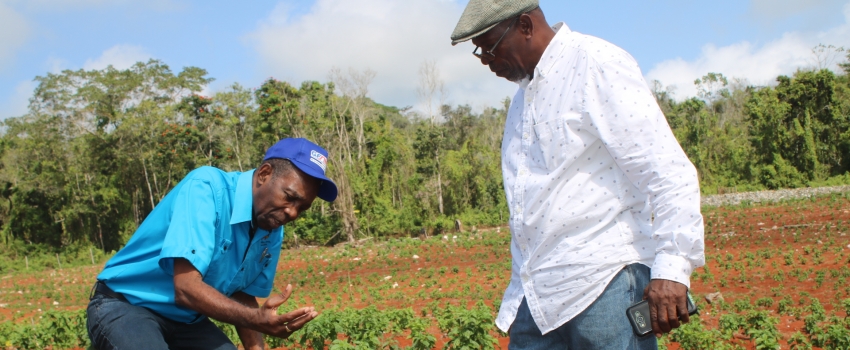
Hon J.C. Hutchinson (left), Minister without Portfolio in the Ministry of Industry, Commerce, Agriculture and Fisheries, examines a Caribbean Red Pepper plant along with Thomas Francis during a tour of his five-acre pepper farm in Belmont, St. Ann, on February 8. Mr Francis is a member of the Progressive Farmers Benevolent Society, which consists of 40 farmers in the Orange Park and Hinds Town areas of St. Ann where red pepper, pumpkin, sweet potato and Irish potato are grown on approximately 1,500 acres of land.
Government has committed some $30m for the implementation of five water-harvesting projects in St. Ann. This was announced by the Hon J.C. Hutchinson, Minister without Portfolio in the Ministry of Industry, Commerce, Agriculture and Fisheries, as he addressed farmers during a meeting of the Progressive Farmers Benevolent Society on February 8 in Orange Park, St. Ann.
In acknowledging the impact of climate change on the agricultural sector to include extended droughts, Minister Hutchinson said that Government, through the agricultural component of the GOJ/Adaptation Fund, has embarked on a deliberate strategy to facilitate investments in alternative water harvesting and management methods such as the establishment of water-harvesting and gravity drip irrigation systems.
“Through this programme, we aim to enhance climate resilience of the agricultural sector by improving water and land management, especially in the parishes of Manchester, Trelawny, St. Mary, St. Catherine, Clarendon and here in St. Ann, which face the greatest level of risk, “said Minister Hutchinson.
Work is in progress on a 1-million gallon reservoir in Hinds Town, Minister Hutchinson said, which will be complemented by on-farm drip irrigation systems. Other communities in St. Ann to benefit from water-harvesting systems are McNie and Frank Hall, Walkerswood and Blackstonedge.
Minister Hutchinson congratulated the group for its contribution to the growth of the agricultural sector. He emphasised the importance of farmers organising themselves into groups, noting that structured groups facilitated, among other things, bulk buying of inputs, and sharing of resources.
Other initiatives articulated by Minister Hutchinson included the establishment of agro economic zones that would seek to address the marketing issues being experienced by the farmers, as well as a school breakfast programme and school gardens in primary schools.
Through the agro economic zones, Minister Hutchinson explained that farmers would be able to sell all their produce, which would then be graded and sold to buyers or processed into puree, juice or sauces. The leftover would then be used as fertilizer or feed.
-30-






















